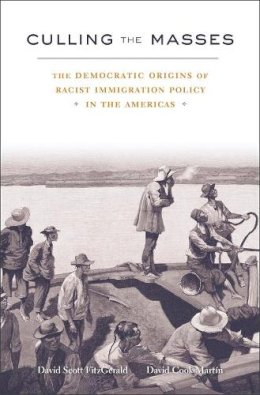7%OFF

Stock image for illustration purposes only - book cover, edition or condition may vary.
Culling the Masses
David Scott Fitzgerald
€ 67.63
€ 63.03
FREE Delivery in Ireland
Description for Culling the Masses
Culling the Masses questions the view that democracy and racism cannot coexist. Based on records from 22 countries 1790-2010, it offers a history of the rise and fall of racial selection in the Western Hemisphere, showing that democracies were first to select immigrants by race, and undemocratic states first to outlaw discrimination. Num Pages: 448 pages, illustrations. BIC Classification: JFFJ; JFFN; JFSL; JPB; LNDA1. Category: (G) General (US: Trade); (P) Professional & Vocational; (UP) Postgraduate, Research & Scholarly. Dimension: 164 x 236 x 38. Weight in Grams: 900.
Culling the Masses questions the widely held view that in the long run democracy and racism cannot coexist. David Scott FitzGerald and David Cook-Martín show that democracies were the first countries in the Americas to select immigrants by race, and undemocratic states the first to outlaw discrimination. Through analysis of legal records from twenty-two countries between 1790 and 2010, the authors present a history of the rise and fall of racial selection in the Western Hemisphere.
The United States led the way in using legal means to exclude “inferior” ethnic groups. Starting in 1790, Congress began passing nationality and ... Read more
Product Details
Publication date
2014
Publisher
Harvard University Press United States
Number of pages
448
Condition
New
Number of Pages
512
Format
Hardback
Place of Publication
Cambridge, Mass, United States
ISBN
9780674729049
SKU
V9780674729049
Shipping Time
Usually ships in 7 to 11 working days
Ref
99-1
About David Scott Fitzgerald
David Scott FitzGerald is Associate Professor of Sociology at the University of California, San Diego. David Cook-Martín is Associate Professor of Sociology at Grinnell College.
Reviews for Culling the Masses
Culling the Masses is a book of impressive analytical and empirical scope. It consists of truly comparative cross-national research and analysis, examining immigration politics and policy in no fewer than six countries in the Americas: Argentina, Brazil, Canada, Cuba, Mexico, and the United States. It asks important questions about the troubling relationship between racism and democracy. Specifically, it addresses two ... Read more
